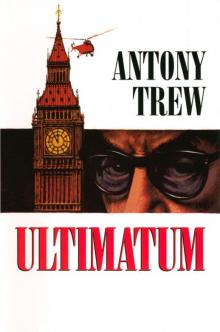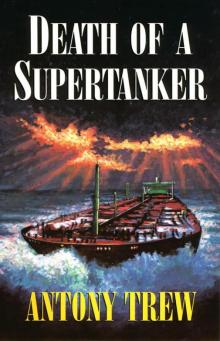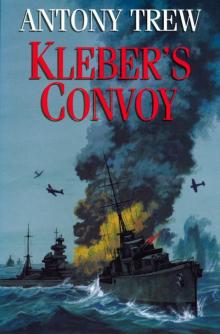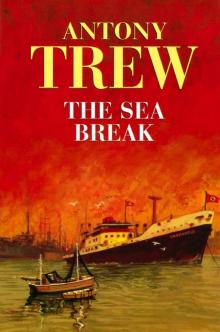- Home
- Antony Trew
Ultimatum Page 2
Ultimatum Read online
Page 2
Ka’ed looked at the girl. ‘Make-up is your job, Jasmine. What do you think?’
‘He’ll look like the Colonel when I’ve finished with him. Don’t worry.’ She examined the photograph of the Colonel. ‘I see what Assaf means about the stomach. But we can fix that. It’s no problem.’
‘Good.’ Ka’ed rubbed the underside of his moustache with a knuckle. ‘Assaf, tell us what you know of the Colonel. His house in Damascus. Where it is. What it looks like. His wife and children and other relatives. Tell us about the servants, too.’
In a deep throaty voice Kamel told them what he knew and it was a good deal for he’d spent a week in Damascus learning what he could about the Dahan family, photographing them with his Minolta spy camera, listening to their conversation at night through an Epines 258 XVe directional mike and amplifier while he sat in a car close to the open windows of the house.
When he’d finished Ka’ed said, ‘You’ve done well, Kamel. You always do.’
There was some discussion then about the movements of a ship called Leros, after which Ka’ed gave them a thorough briefing. At the end of it each knew exactly what had to be done and when. Timing was an important part of the operation.
It was after midnight when they broke up and left in twos and threes to go their separate ways. When all had gone but Ka’ed’s bodyguard, Abdu Hussein, he turned off the lights and they climbed the stairs to the street. It was warm, the sky bright with moon and stars, and there was little traffic. They walked towards Rue Shahla, keeping a careful lookout, conscious of the Walther 7.65 mm automatics in their shoulder-holsters, the combat knives in their belts. There were many who would have liked Ka’ed dead – and they were not only the Falangists and the Israeli secret agents who abounded in Beirut. In earlier days his face had been heavily bearded. Now, clean shaven, with moustache and dark glasses, few would have recognized him as Marwan Haddad, the name by which he had been known in the PLO. It was, as it happened, his real name.
At the University College of Beirut he had read philosophy and political science and there made the contacts and friendships which led him into the ranks of the Palestine Liberation Organization. At first a devoted disciple of Yasir Arafat, he’d later become disillusioned with the leader’s diplomatic strategy, his caution and what Ka’ed regarded as fatal lack of militancy. After quarrelling with Arafat, Ka’ed drifted from the centre to the extremist flank. There he became an embarrassment to the PLO leadership and attempts were made to discipline him.
Predictably, he broke away with a handful of followers and established a splinter group, Soukour-al-Sahra’ – the Desert Hawks. The choice of name was not without significance. He made no secret of his policy: intransigent militance, unremitting violence, escalating terrorism. He believed implicitly in Mao’s philosophy: ‘Power comes from the barrel of a gun’. Step-by-step diplomacy, the Geneva Conference, Kissinger’s attempts at an Arab-Israeli détente were, he was convinced, a waste of time.
Under Ka’ed’s leadership Soukour-al-Sahra’ – the SAS – had embarked on a widespread campaign of bombings, hi-jacks, kidnappings, bank hold-ups and assassinations. What funds they needed came from these operations, the ingenuity and success of which caught the imagination of many young Palestinians who, like Ka’ed, were impatient and believed that militant action was the only way to secure an independent Palestine. Like him they were ready to die for their cause; indeed they did, for the SAS suffered casualties, though nothing like as many as they inflicted.
By late 1975 they had grown into a well-organized highly effective extremist group working outside the umbrella of the PLO. And they were beginning to make themselves felt, not only in the Middle East but in the chancelleries of the Western World.
Mahmoud el Ka’ed knew he was responsible for this. Not that he thought overmuch of his successes. The political objective was still too far from attainment, the real achievement yet to come. It was upon this that all his energies – what his enemies called his fanaticism – were now bent as he prepared what he liked to think of as The Final Solution.
3
The undistinguished-looking coaster with the red-banded white funnel entered Beirut Port in the late evening and berthed at the eastern end of the new basin in St Georges Bay.
There she lay, small and inconspicuous, dwarfed by the ships of the Messagerie Maritime, the American Export Lines, the Hellenic Mediterranean and the Khedive Mail Lines, and other vessels larger and more important than she was. But at least this was her home port and most of her crew lost no time in getting ashore that night to be with families and friends. Among those who remained on board were the two Syrians who’d signed for the grey packing cases in Marseille at the time of loading.
The bearded young galley-hand with the scarred neck was one who did go ashore. Outside the port gates he took a taxi to the Safa Mosque. He paid it off and walked, following a circuitous route, bound for the rendezvous where he was to meet Ka’ed. Often he looked back to see if he was being followed.
At eight o’clock on the night the Byblos arrived in Beirut Port the hatches on number two hold were lifted, a crane manoeuvred into position, two Benz six-wheeler trucks came alongside and the sixteen grey packing cases were transferred to them. On either side of their driving cabs the trucks were lettered ‘D. B. MAHROUTTI BROS’ – and below that ‘Agricultural Machinery’. No other cargo was off-loaded that night. Soon after the six-wheelers left the quay the two Syrian passengers came ashore.
In a dark shadowed alleyway between transit sheds a man had been watching the off-loading. Shortly before it finished he went to the back of the shed and picked up a motorcycle. He wheeled it down the length of the sheds to a point where he could watch the roadway along which the trucks would travel.
Before long he heard the sound of their engines. Soon afterwards they passed. He started the motorcycle and followed at a safe distance. The trucks travelled down towards the western side of the harbour, crossed the road which led to the main gates, turned right, then left, and stopped outside a large shed near the Rue de Trieste. It was not far from the Port Captain’s office. The area was poorly lit but the man astride the motorcycle, motionless in the shadows, saw dark shapes climb from the trucks and slide open the doors of the shed. The six-wheelers were driven in, the doors shut behind them and he heard the slamming of bolts. Later two men arrived on foot. They knocked at the small door beside the main doors and were admitted.
The man wheeled his motorcycle back towards the railway lines, pushed it across and started the engine. He followed the route he’d come by until he reached the road to the main gates. He turned into it, passed through the gates and made off into the city.
There were stacks of cargo of various sorts in No. 27 – the dimly-lit shed where Colonel Rashid Dahan and his officers were talking to the two late arrivals. All wore civilian clothes. The Colonel and those who’d come in the trucks with him were dressed as workmen.
‘Was the journey all right, Roumi?’ he enquired.
‘Successful but not very comfortable. We had bad weather in the Gulf of Lyons. It made us sea-sick.’
The Colonel smiled, showing fine white teeth. ‘All part of the day’s work for soldiers.’
‘We gave thanks to Allah that we were not sailors,’ said the younger of the two.
‘Any questions asked in the ship?’
‘No. The captain had been told we were Mahroutti’s representatives. That this was an important and valuable consignment. Irrigation equipment of a new type for the agricultural settlement at Bekàa. That we had been sent to supervise its handling and stowage. The rest of the crew were not interested.’
The discussion with the late arrivals continued for some time. Eventually, having agreed with the Colonel that they would proceed independently to Damascus on the following day, they left the shed and disappeared into the darkness.
The Syrian officers sat on packing cases, talking in low voices, some smoking. It was still only ten-thirty. Too early fo
r sleep. They knew an uncomfortable night lay ahead. It was warm and the air in the transit shed was stuffy, pungent with the smell of copra, bags of which were stacked in a far corner. The only places to rest were the driving cabs of the Benz six-wheelers.
‘It will be a long night,’ said the Colonel, reading their thoughts. ‘We shall take it in turns to rest. I don’t think sleep will be possible.’
‘Except for Azhari,’ said a young officer. ‘He passes out like a light. And snores.’
Azhari protested and there was a ripple of laughter.
Beneath their clothes, Colonel Rashid Dahan and his men were armed with Stetchkin 9mm automatic pistols. They had been supplied to the Syrian Army by the Soviet Union.
In the early hours of morning there was knocking on the doors of the transit shed. Dahan alerted his men and went to the door accompanied by Azhari. He saw by his wristwatch that the time was seventeen minutes past one.
‘Who is there?’ he demanded.
‘Abdul Hassami, Assistant Port Captain,’ came the reply. ‘I have an urgent message for Colonel Rashid Dahan.’
The Colonel nodded to Azhari and took up a position beside the door. The hand he thrust into his jacket clasped the butt of the 9mm Stetchkin. In one quick motion he opened the door and shone a torch in the face of the man standing there. He was wearing the uniform of a senior port official.
‘I am Colonel Rashid Dahan,’ said the Colonel. ‘What is the message?’
‘You are wanted on the telephone, sir. Your wife is calling from Damascus.’ The port official hesitated. ‘I am sorry, Colonel, but there has been an accident. It is your son, Omar. Your wife has just returned from the hospital.’
‘In the name of Allah!’ The Colonel stiffened, the colour draining from his cheeks. ‘He’s …?’ he gulped. ‘He’s not dead?’
‘No, sir. But she says it is serious. His bicycle collided with a car.’ Hassami paused, looking sorrowfully at the Syrian. ‘Please follow me to the port office, sir.’
The Colonel’s energy seemed to drain away, his knees felt weak and his head spun. Omar was his eldest and favourite son. Only a few weeks back the boy had celebrated his twelfth birthday. It was then the Colonel had given him the new bicycle. With an effort of will he cleared his mind. ‘Yes,’ he said. ‘I’ll come. One moment, please.’
He hurried over to the trucks. ‘Take charge, Aramoun,’ he said. ‘There is an urgent telephone call for me from Damascus. From my wife. Omar has had an accident.’ His voice trembled with emotion. ‘I must go to the port office. I won’t be long.’
‘Of course, Rashid.’ The man who spoke was a major, the Colonel’s second-in-command and close friend. ‘I am sorry. May Allah be merciful.’
Dahan stared at him helplessly, turned on his heel and went back to the door. He stepped outside and joined the port official. Together they set off down the roadway between the sheds.
‘It is not far,’ said Hassami. ‘A few minutes only.’
The Colonel was too shattered to say anything.
At the end of the shed the roadway turned towards the harbour. They followed it until Hassami said, ‘Down here, sir. It’s a short cut.’
They left the road and walked down a darkened alley between sheds, the port official leading. Over his shoulder he said, ‘Your wife mentioned that it was a new bicycle. A birthday present.’
‘I know,’ said the Colonel heavily. ‘I wish I had never given him the accursed thing.’
‘You cannot blame yourself.’ Hassami added, ‘It is the will of Allah. We are almost there.’
‘Good,’ said the Colonel. It was the last word he was to utter for at that moment he was struck over the head from behind and slumped to the ground. Two men loomed out of the darkness as the Assistant Port Captain leant over the recumbant figure. ‘Well done, Ammar,’ he said to one of them. ‘Move fast now.’
Ammar Tarik handed the cosh he was holding to Hassami who took up a position at the top of the alleyway, while the new arrivals stripped the unconscious Dahan of all he was wearing save his underpants. Tarik took off his own slacks and shirt and changed into the Colonel’s clothes. ‘I don’t mind the make-up,’ he whispered, ‘but this padding is awkward.’ He passed his own slacks and shirt to the other man. ‘Look after these.’
‘It’s not for long,’ said his companion, making the clothes into a bundle. ‘Pity there’s no light. I’d like to compare you with him.’ He looked at the almost-naked body on the ground.
‘Right,’ said Tarik a few minutes later. ‘I’m ready.’ He let out a low whistle. They heard the scrape and shuffle of feet at the top of the alleyway.
‘They’re coming,’ said the other man. The unconscious Syrian began to moan. Tarik dropped down beside him, clamped a hand over his mouth to muffle the sound. The men in the alleyway arrived, led by the Assistant Port Captain. ‘Ready?’ His whisper was urgent.
Tarik said, ‘Yes, Mahmoud. But he’s groaning. My hand’s over his mouth.’ Hassami knelt and in the darkness it seemed to Tarik that he was striking Dahan in the chest. The thumps were followed by coughing and a gurgling sound. The Colonel’s body twitched spasmodically then lay still. Hassami stood up. ‘I had to,’ he said, putting the Colonel’s 9mm Stetchkin into a pocket of his uniform jacket. ‘He might have identified me.’
‘You had no choice.’
There was hurried consultation, the assistant port captain issued instructions and the men disappeared into the night. When they’d gone he wiped the blade of his knife on the Colonel’s underpants, replacing it in the sheath on his belt. The knife had been a problem for Mahmoud el Ka’ed. It did not fit easily under the tight jacket of the uniform he was wearing – the uniform of an assistant port captain.
4
In the Israeli Embassy, not far from Kensington Palace Barracks, the Ambassador was talking to Ezra Barlov, head of the intelligence section. ‘So Kahn believes it is imminent. On what authority?’
‘On information gathered by Tel Aviv.’
‘Who are these people?’
‘Difficult to say. It hasn’t yet been possible to establish their affiliations. We didn’t know about Spender Street until comparatively recently.’
‘How did Kahn get on to them originally?’
Barlov dropped his spectacles, made much of bending down to search for them – how could he tell the Ambassador that Samia Khayat, the Palestinian girl working in the London office of an insurance company with extensive Middle East interests, had in recent months become a close friend of Sandra Hamadeh, a girl working in the same typing pool, who shared an apartment off the Bayswater Road with her brother? – how could he explain that Samia Khayat was Rachel Margolis, an Israeli agent ‘planted’ in London five years ago? Deep cover was sacrosanct.
Barlov retrieved the fallen spectacles and returned to his chair. ‘I’m afraid that’s something Tel Aviv hasn’t told me, Ambassador.’
The older man looked mildly embarrassed. ‘I’m sorry. I shouldn’t have asked. Now – you say Kahn thinks this is the target?’
‘He rates it as probable.’
The Ambassador threw his hands up in a token of despair. ‘Jakob Kahn’s probables and possibles.’
Barlov’s thin face broke into a smile. ‘It’s not a bad way of assessing the risks. Courses of action open to the enemy.’
‘And he believes the people at Mocal are involved?’
‘He thinks it’s possible. That’s why they’re under surveillance.’
The Ambassador, a plump, fatherly figure, folded his arms, leant back in his chair. ‘Tell me about Mocal.’
‘The business is called Middle Orient Consolidated Agencies Limited. Import, export agents. For the last three months they’ve occupied premises at 39 Spender Street. Two offices on the ground floor. Before that it was a shell company bought for next to nothing by the three Palestinians who run it.’
‘What is known about them?’
‘Very little really. We know what each of them looks li
ke, the names they use. All new to us. We’ve no previous history of any of them. They’ve been in London for some time, at least six months – that’s Hanna Nasour – and one of the men, Najib Hamadeh, as long as two years. We’re satisfied the business is a phoney.’
‘But, good cover.’
‘That’s the idea.’
‘On what evidence, Barlov?’
‘They don’t seem to do any business.’
‘And this operation? What does Kahn think. Bomb attack?’
‘Probably. At least an attack with explosives. Possibly bomb or bazooka.’
The Ambassador got up from his desk, took off his glasses and cleaned them with slow deliberation. ‘What do you propose to do?’
‘Kahn wants the premises bugged.’
‘Is that possible?’
‘It is.’
‘When?’
‘In the next twenty-four hours.’
‘I hope nothing goes wrong, Barlov. We can’t afford a Watergate.’
‘There is no prospect of the Embassy being involved, Ambassador. Ascher and his people have excellent cover and they are highly professional.’
From the bay window of the small apartment near Vauxhall Bridge he could see over Lambeth Bridge to the Houses of Parliament and Westminster Bridge. Beyond that the Thames faded into the mists of an autumn evening. He was enjoying its tranquillity when he heard the sound of a key turning in the lock. He took the Mauser automatic from his shoulder-holster and stood against the wall. The door opened and a young woman came in.
‘Hi,’ he said. ‘You’re late.’
‘It was Johnnie Peters. He wouldn’t let me go.’
‘Your scene?’ He put the revolver back into the shoulder-holster.
‘Not really. He’s all right. Very jealous and inquisitive. Wants to know what I do, where I work.’

 Ultimatum
Ultimatum Death of a Supertanker
Death of a Supertanker Kleber's Convoy
Kleber's Convoy The White Schooner
The White Schooner The Sea Break
The Sea Break